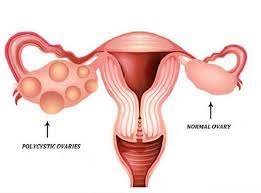The widespread condition known as polycystic ovary syndrome (PCOS) affects your hormones. Infertility, excessive hair growth, acne, and irregular menstrual cycles are all effects. Your PCOS treatment will be impacted by whether or not you want to become pregnant. People with PCOS may be more susceptible to diseases like diabetes and high blood pressure.
What does polycystic ovarian syndrome mean?
Too much hormone production by your ovaries, the organs in charge of creating and releasing eggs, can result in polycystic ovary syndrome (PCOS), a hormonal imbalance. If you have PCOS, your ovaries produce too many androgens. It affects the hormonal balance that governs reproduction in you. As a result, PCOS patients frequently have unpredictable ovulation, missed periods, and irregular menstrual cycles. Small follicle cysts, fluid-filled sacs containing immature eggs, may be visible on your ovaries on ultrasound when you don’t ovulate (anovulation). Although PCOS is called “polycystic,” having ovarian cysts is not a requirement for the condition. Ovarian cysts are neither dangerous nor bothersome.
When does PCOS first appear?
PCOS can manifest in both women and AFABs at any time after puberty. Most people are diagnosed in their 20s or 30s, typically when trying to get pregnant. Your risk of getting PCOS may increase if you are obese or have the condition running in your biological family.
How widespread is PCOS?
PCOS is a condition that affects up to 15% of women and people AFAB who are of reproductive age.
What are the symptoms of PCOS, or polycystic ovary syndrome?
The followings are the most common warning signs and symptoms of PCOS:
- Missing periods or not menstruating at all are examples of irregular menstrual cycles. Additionally, it might cause substantial bleeding during periods.
- Unusual hair growth: If you have hirsutism, you may notice heavy hair growth on your arms, chest, and abdomen. Up to 70% of PCOS sufferers report this.
- Acne can result from PCOS, especially on the face, chest, and back. It may be difficult to treat your acne if it lasts past your teen years.
- Obesity: Between 40% and 80% of PCOS patients struggle to keep their weight within a healthy range.
- Skin darkening: It’s possible to develop patches of dark skin, especially in the folds of your neck, armpits, groin (between the legs), and under your breasts. It is known as acanthosis nigricans.
- On ultrasound, the ovaries of many PCOS patients appear larger or have more follicles than usual (egg sac cysts).
- Skin tags: Skin tags are teeny, protruding skin flaps. They frequently reside in the armpits or the back of your neck.
- People with PCOS may experience patchy hair loss or start losing their hair altogether.
- The most frequent cause of infertility in AFAB people is PCOS. The inability to conceive could result from irregular or infrequent ovulation.
What causes PCOS primarily?
PCOS does not have a recognized cause. Evidence suggests that genetics may be at play. A wide range of additional factors, including obesity, influences PCOS development.
- Increased levels of the male hormone androgen: Irregular ovulation can cause small, fluid-filled sacs to develop on your ovaries. High androgen levels also contribute to acne and excessive hair growth in women and people with AFAB.
- Insulin resistance: As your insulin levels rise, your ovaries produce and release androgens, which are male hormones. Ovulation is prevented by elevated male hormones, which also contribute to other PCOS symptoms. With the help of insulin, your body breaks down glucose (sugar) and uses it as fuel. Your blood glucose levels are elevated due to improper insulin processing, which causes insulin resistance. Even though not everyone with insulin resistance has diabetes or high blood sugar, diabetes can be brought on by insulin resistance. Additionally, raising the risk of developing insulin resistance is being overweight or obese. A high insulin level may indicate insulin resistance even if your blood sugar is within the normal range.
- Inflammation of low intensity: PCOS patients frequently experience inflammation of low intensity. Your doctor can perform blood tests to measure white blood cell counts and C-reactive protein (CRP) to determine how much inflammation is present in your body.
















